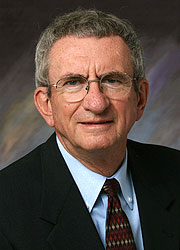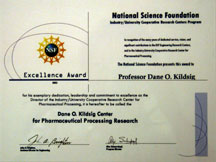Overview
The Center for Pharmaceutical Processing Research (CPPR) is an industry/university cooperative research center (I/UCRC) focusing on critical parameters in pharmaceutical manufacturing processes. CPPR was founded in 1995, as one of over 80 such Centers established by the National Science Foundation (NSF), and the only one devoted to pharmaceutical processing research. The Center comprises three Universities – Purdue University, the University of Connecticut, and the University of Minnesota.
Faculty members from departments of engineering (chemical, mechanical, civil, agricultural and biological), chemistry, and health sciences have joined with faculty from the core pharmaceutics-related departments in each of the three universities to provide interdisciplinary teams to solve today’s pharmaceutical processing challenges.
The CPPR has an Industrial Advisory Board (IAB) consisting of representatives of member companies that provide annual funds to be distributed to the research projects given priority by IAB members. Faculty, often in consultation with IAB members, propose projects that are presented at the bi-annual scientific conferences. IAB members provide mentorship for the projects to ensure industrial relevance.
The CPPR approach is to combine industrial relevance with academic rigor in its projects. The combination translates into scientifically sound know-how, transferred to companies in an industrially appropriate time frame. The CPPR works toward its goals through continuously enhancing its educational objectives and adapting them to the existing industrial environment. Research projects provide our graduate students with first-rate training on a scientific approach to formulation and process research, producing scientists with a fundamental understanding of scientific areas of critical industrial relevance.
History


How CPPR Operates
Pharmaceutical and related companies that contribute an annual fee and agree to the terms and conditions of the CPPR sponsorship agreement may join the CPPR through any of the four academic partners. Representatives of the companies become voting members of the Industrial Advisory Board (IAB) of CPPR. The IAB provides guidance, feedback, cooperative research, and “real world” experience to assure industrial relevance of the CPPR research projects led by faculty at the four partner universities. University faculty contribute their time and expertise, using primarily the research facilities of their universities, to conduct investigations into relevant fundamental processing research areas. The projects are often in areas to which companies and agencies cannot devote their internal resources, but for which several companies agree to collectively support through the CPPR. The CPPR also serves to provide university researchers the incentive to explore industrially relevant ideas, not central to their laboratory’s focus, but well within their expertise.
Projects are selected for funding from among those proposals presented at the CPPR bi-annual meetings (Fall and Spring) based on a vote of the Industrial Advisory Board (IAB) members. Proposals are first presented at a bi-annual meeting for feedback only. This allows the IAB members to steer the projects toward areas of greatest interest/need and seek additional input from other scientists in their companies. Proposals are then presented again at the next bi-annual meeting for additional input and a vote by the IAB to determine funding. Each project has at least one industrial mentor to closely follow the progress of the project.
Bi-annual meetings last 1 ½ days and are hosted by one of the university partners. Each meeting has a one-day scientific session on pharmaceutical processing with presentations of project proposals, final reports, and poster updates of ongoing projects, and often include invited speakers, special sessions, and 3-minute summaries of the dissertations of graduate students involved in CPPR projects. The final half day is a closed session of the IAB to address CPPR business and to discuss in detail the proposed projects before voting on which projects to approve.
Intellectual property developed though CPPR research at the universities remains with the university at which it was developed. IAB companies have the option to obtain a non-exclusive royalty-free license for in-house use of the patentable invention or copyrightable materials developed under the auspices of CPPR. Additional information and details of the handling of intellectual property developed through CPPR research is fully described in the sponsorship agreement signed by companies joining the CPPR.